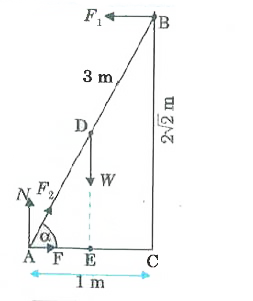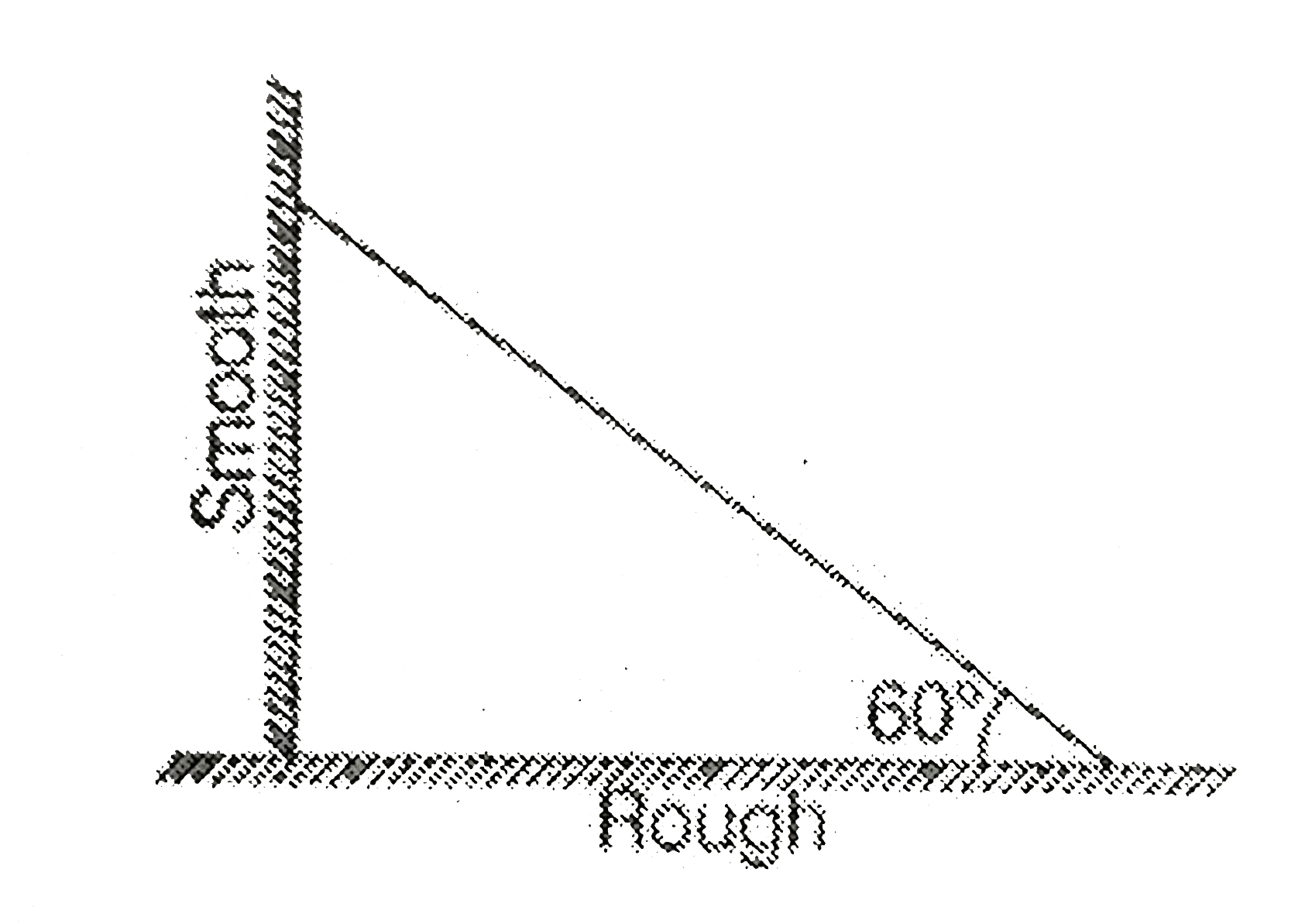A 3 m long ladder weighing 20 kg leans on a frictionless wall. Its feet rest on the floor 1 m from the wall as shown in the following figure, Find the reaction forces of the wall and the floor.

Here, AB=3m
AC=1m
BC=√AB2−AC2=√32−12=2√2m
Force acting on the ladder:
1. Weight acting at centre of gravity D
2. Reaction force F1 of the wall at B
3. Reaction force F2 of the floor at A, which can be resolved into two components: normal reaction N and force of friction F. The frictional force F prevents the ladder from sliding away from the wall and is thus directed towards the wall.
For translational equilibrium in vertical direction,
N=W
For translational equilibrium in horizontal direction,
F=F1
For rotational equilibrium, considering the moments about point A, we have
F1×BC=W×AE [N,F2 and F will have zero moment about A]
⇒F1×2√2=W×12
Given, W=20g=20×9.8=196N
∴F1=1964√2=34.6N
N=W =196 N
F=F1=34.6N
F2=√(F)2+N2=√34.62+1962=199N
If F2 makes and angle α with F then
tanα=NF=4√2=5.657
⇒α≅80
Topper's Solved these Questions
- SYSTEMS OF PARTICLES AND ROTATIONAL MOTIONBOOK - MODERN PUBLICATIONCHAPTER - SYSTEMS OF PARTICLES AND ROTATIONAL MOTIONEXERCISE - PRACTICE PROBLEMS
26 Videos
- SYSTEMS OF PARTICLES AND ROTATIONAL MOTIONBOOK - MODERN PUBLICATIONCHAPTER - SYSTEMS OF PARTICLES AND ROTATIONAL MOTIONEXERCISE - Conceptual Questions
24 Videos
- PHYSICAL WORLD BOOK - MODERN PUBLICATIONCHAPTER - PHYSICAL WORLD EXERCISE - Revision exercises (Long answer questions)
6 Videos
- THERMAL PROPERTIES OF MATTERBOOK - MODERN PUBLICATIONCHAPTER - THERMAL PROPERTIES OF MATTEREXERCISE - CHAPTER PRACTICE TEST
15 Videos
Similar Questions
Knowledge Check
The height of the hall is 13 m and the perimeter of its floor is 430 m. Find the area of four walls of the hall.
A9590 m2B5590 m2C9055 m2D5059 m2A ladder of mass 10kg is held at reat against a smooth wall on a rough ground as shown in figure. The normal reaction between the wall and the ladder is
 A50NB50√3NC60√3ND100N
A50NB50√3NC60√3ND100N
A ladder 10m long rests against a vertical wall. If the foot of the ladder is 6m away from the wall and the ladder just reaches the top of the wall, how high is the wall?
View SolutionA ladder 5 m long leans against a vertical wall. The bottom of the ladder is 3m from the wall. If the bottom of the ladder is pulled 1 m farther from the wall, how much does the top of the ladder slide down the wall
View SolutionIf a ladder which is 10m long rests against a vertical wall. If the base of ladder slides away from the wall at 1 m/s then how fast is the top of the ladder sliding down along the wall when the base is 6 m from the wall ?
View SolutionA ladder makes an angle of 30∘ with a wall. If the foot of the ladder is 5 m away from the wall, find the length of the ladder.
View SolutionA 50 m long ladder reaches a window 14 m above the ground. Find the distance of the foot of the ladder from the base of the wall.
View SolutionA man of mass 40kg is at rest between the walls as shown in the If '●' between the man and the walls is 0.8 find the normal reactions exerted by the walls on the man .
View Solution
